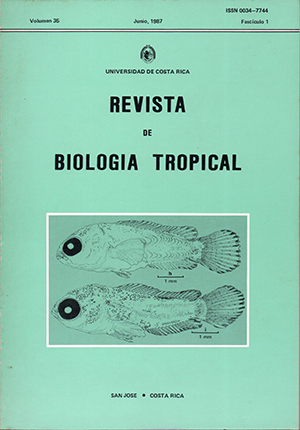Abstract
The eggshell of the red turtle, Rhinoclemmys pulcherrima is composed of an external cuticle, a
middle calcareous layer and the internal membrane. The cuticle is not sculptured as in those of the kinosternidae. The radial view is similar in eggs of Geochelone elephantopus. The cuticle of R pulcherrima shows superficial fractures or crevices whose complementary edges are similar to a jigsaw puzzle. The calcareous layer is formed by structural units composed by groups of needle-like aragonite crystals. In the crocodilian egg, the shell shows calcite deposited in lates instead of aragonite. The calcareous units are interlocked, a situation that is not present in the shell of marine turtle eggs (Lepidochelys olivacea and Chelonia mydas). The inner extremes of the calcareous units are !U rrounded by a palisade of needle-like aragonite erysta!s. This type of stru erure is not o bserved in other reptilian eggshells.
References
Acuña M., R.A. 1980. Aspectos biológicos de la fase terrestre de la tortuga lora Lepidochelys olivacea. Tesis para optar al grado de Magíster Scientiae en Biología. 115 p.
Acuña M., R.A. 1984. La ultraestructura superficial de la cáscara del huevo de la tortuga marina Lepidochelys olivacea Esclucholtz. Brenesia 22: 299-308.
Castillo C., V. 1986. Aspectos ecológicos y económicos de la reproducción de dos especies de tortugas costarricenses. Tesis para optar al grado de Licenciado en Biología. 150 p.
Ewert, M.A. 1979. The embryo and its egg: Development and natural history. pp: 333-413. In M. Harlen and H. Morlock (eds.). Turtles: Perspectives and Research. John Wíley, New York.
Ferguson, M.W.J. 1981. Extrinsic microbial degradation of the alligator eggshell. Science 214: 1135- 1137.
Hirsch, K.F. 1983. Contemporary and fossil chelonian eggshells. Copeia, 1983: 382-397.
Hirsch, K.F. 1985. Fossil crocodilian eggs from Eocene of Colorado. 1. Paleont. 59: 531-542.
Packard, M.J.; K.F. Hirsch & J.B. Iverson. 1984. Structure of shells from eggs of kinosternid turtles. J. Morph. 181: 9-20.
Packard, M.J.; K.F. Hirsch & V. B. Meyer-Rochow. 1982. Structure of the shell from eggs of the tuatara, Sphenodon punctatus. J. Morph. 174: 197-205.
Rahn, H.; A. Ar & G.V. Paganelli. 1979. How bird eggs breathe. Sci. Amer. 240: 38-47.
Silyn- Roberts, H. & R.M. Sharp. 1985. Preferred orientation of calcite and aragonite in the reptilian eggshells. Proc. R.Soc. Lond. B. 225: 445-455.
Solomon, S.E. & T. Baird. 1979. Aspects of the biology of Chelonia mydas L. Oceanogr. Mar-Biol. Ann. Rev. 17: 347-361.
##plugins.facebook.comentarios##

This work is licensed under a Creative Commons Attribution 4.0 International License.
Copyright (c) 1987 Revista de Biología Tropical


